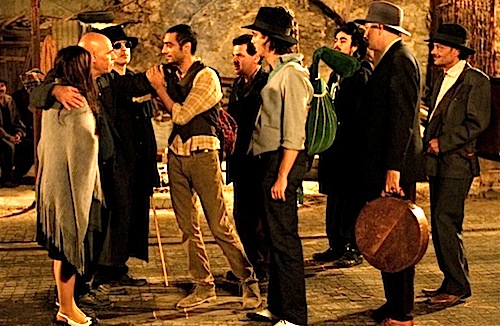By Joe Bendel. Who has a harder time adjusting to the capitalist system: a former Soviet republic or a documentary filmmaker? Needless to say, it is the latter, but he still has his mind set on importing Ukrainian vodka into the British marketplace. He feels a special connection to the distillery, because his family used to own it, up until the 1917 Revolution. Soviet, Ukrainian, and even Northern Irish history are explored from a decidedly personal perspective in Dan Edelstyn & Hilary Powell’s How to Re-Establish a Vodka Empire, which screens during the 2013 New York Jewish Film Festival, co-presented by the Jewish Museum and the Film Society of Lincoln Center.
Edelstyn knew little of his father’s side of the family, because he died when the filmmaker was quite young. His first real introduction to his Ukrainian heritage came through the letters and journals of his grandmother, Maroussia Zorokovich, shunted away in his mother’s attic. He discovered his grandmother was the progressive daughter of a well-to-do land-owning family. Regrettably, all her efforts teaching the local peasantry to read and write meant little to the conquering Bolsheviks.
Zorokovich’s story is truly remarkable, including stints entertaining the White resistance forces as a dancer, which is how she met Edelstyn’s grandfather. From her diaries, Edelstyn gleaned a sense of the family’s house and sugar factory. Drawn to his roots, Edelstyn was disappointed to find them in a state of disrepair and off-limits. However, he discovered another family holding that was still up and running—a vodka distillery.
Zorokovich never mentioned the family vodka empire, but with good reason Edelstyn presumes. Communist propaganda often demonized Jewish Russians as predatory purveyors of alcohol, constantly tempting the stolid peasants into drunkenness. It would be a lot easier for the Jewish Zorokoviches to identify themselves with the sugar plant rather than with a booze pipeline.
Disurbed by the town’s economic stagnation in the wake of the sugar factory’s closure, Edelstyn takes it upon himself to become the vodka company’s British agent. Of course, he knows nothing about importing spirits, but how hard can it be?
Edelstyn might be ridiculously naïve throughout Empire, but his instincts on how to help his ancestral Ukrainian home are surprisingly on-target. It is too bad he and his wife Powell were the ones behind the camera, though, because there was probably considerably more comedy to be mined from his attempts to navigate British customs bureaucracy.
As a result, probably the strongest sequences involve Grandmother Zorokovich. Blending various styles of animation with family heirloom photos, Edelstyn & Powell craft some Guy Maddinesque dramatic recreations of Zorokovich’s life. To their credit, they bring home the fear and arbitrary violence of Lenin’s reign of terror (yes, Lenin’s – not that of the subsequent tyrant, Stalin) with full force, as well as chronicle the Zorokovich’s complicated years in Belfast. It is an epic story to which they do justice.
While Edelstyn undeniably went out on a limb on behalf of the former family vodka company, there is still an awful lot of him in Empire. He is not a bad chap at all, but he is not exactly a riveting cinematic presence.Regardless, How to Re-Establish a Vodka Empire documents a fascinating intersection of commercial, political, religious, and family history that goes down rather smoothly.
It is preceded by Jack Feldstein’s brief but powerful Shards. An expressionistic, almost abstract representation of Peretz Markish’s similarly titled poem, Feldstein’s neon-animated short film serves as a stark elegy to the poet and to the other twelve Yiddish writers murdered by Stalin’s minions of terror in 1952. While only two minutes long, it powerfully conveys the essence of the Soviet experience. Both films are highly recommended when they screen this Thursday (1/10) and Saturday (1/12) as the 2013 NYJFF gets underway at the Walter Reade Theater.
LFM GRADE: A-
Posted on January 7th, 2012 at 1:56pm.


